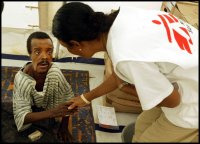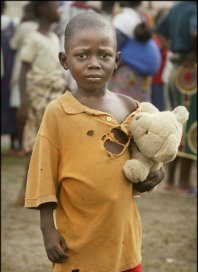MSF Treating War Wounded Civilians; One Staff Member Killed
Monrovia, July 20, 2003 - Two makeshift hospitals run by the international medical humanitiarian organization Doctors Without Borders/Medecins Sans Frontieres (MSF) in the Liberian capital of Monrovia are treating upwards of eighty civilians severely wounded in the third round of fighting in the city in less than two months between government militias and Liberians United for Reconciliation and Democracy (LURD) rebel forces. Yesterday evening, a mortar hit the home of an MSF Liberian staff member shortly after he returned from work. He died before arriving at the MSF emergency room in Mamba Point.

MSFF Hospital, Mamba Point, Monrovia. Photo © Chris Hondros/Getty Images |
"Shooting and shelling close to our hospitals is making it nearly impossible for us to treat our patients safely," said Alain Kassa, MSF head of mission in Monrovia. "Yesterday, a bullet landed in the middle of our hospital's pediatric ward even as war wounded civilians continued to arrive. Today, we fear the fighting in the streets is so intense that the wounded cannot be transported to the hospital for treatment."
On Friday, fighting forced MSF to suspend work in three medical clinics serving tens of thousands of displaced persons in Montserrado County just north of Monrovia. As hostilities intensified in the area, thousands of camp residents began streaming toward what they hoped would be safety in Monrovia. Last night, many of them had joined an estimated 20,000 displaced persons already taking shelter in the Samuel K. Doe Stadium in Monrovia where MSF continues to run a medical clinic, cholera treatment center, and water facilities.

IDPS in Doe Stadium. Photo © Chris Hondros/Getty Images |
On Saturday, MSF evacuated 50 critical cholera patients from two MSF cholera treatment centers close to the fighting to emergency facilities set up in an MSF compound in the Mamba Point area of the city. One hundred MSF staff members have also sought refuge in an MSF compound in Mamba Point.
"We urge all parties to this conflict to protect civilians caught in the fighting, allow them safe access to medical treatment, and respect the right and urgency of medical structures and staff to do their work safely," stated MSF head of mission Pierre Mendiharat in Monrovia.
Present in Liberia since 1990, MSF is running two hospitals with in- and out-patient, surgical, and nutritional facilities in Monrovia, as well as 8 medical clinics, 4 cholera treatment centers, and emergency water supply points for displaced persons in the city. MSF is also running clinics in 6 camps for displaced persons in Montserrado and Bong Counties.
Unless the Global Fund is replenished, countries' proposals to provide life-saving treatment for people suffering from AIDS, TB or malaria will be refused or postponed.
Small-scale AIDS treatment projects run by MSF and others in developing countries have long proven that antiretroviral (ARV) treatment is possible in resource-poor settings. Countries are beginning to take first steps towards expanding access to ARVs and some are making serious efforts to scale up. These programs will remain the exception rather the rule if the international community doesn't live up to its promises and commitments to fund planned programmes.
Invited by the Malawian Ministry of Health, MSF and other groups providing ARV treatment in Malawi have been involved in drafting the national treatment programme - one of the national proposals sent to the Global Fund. "The plan is well-thought out, sound and realistic. Depending on the price of the drugs used, the Malawian government aims to get 25,000 to 50,000 patients on treatment by 2007," said Dr Nicolas Durier from the MSF ARV programme in the Chiradzulu district in southern Malawi, counting some 800 patients at present.
"If the necessary Global Fund money doesn't come through, up to 50,000 Malawians living with HIV/AIDS will be left to their own devices, without hope of their lives being extended. Turning down the funding will also deliver a fatal blow to the government's ability to tackle the AIDS pandemic in a responsible manner," Dr Durier continued. A total of 800'000 Malawians are currently living with HIV/AIDS.
"We have so far hailed the Global Fund as one of the few global initiatives with the potential to start addressing the AIDS crisis seriously," said Dr Bernard Pécoul, director of MSF's campaign for Access to Essential Medicines. "Everyone agrees that treatment is a key component in responding to the AIDS pandemic. But as long as the only cash on the table to support concrete, technically viable proposals such as those received by the Global Fund is a fraction of the estimated need, there is no way countries can do what everyone wants them to do: treat their people."



